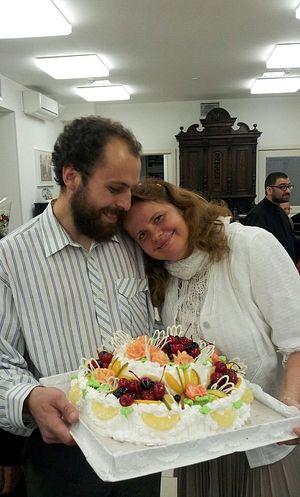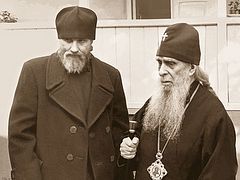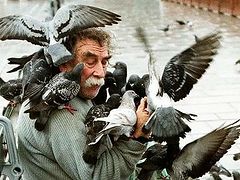January 24, 2019, was the first anniversary since George Velikanov, who served in the altar of the Church of the All-Merciful Savior in Moscow’s Mitino district, saved at the cost of his own life a homeless man from death under the wheels of a suburban train. This real podvig [a heroic deed, exploit in Russian.—Trans.] astonished everyone and reminded all of us what genuine Christianity is about. We have spoken about George Velikanov with his widow Natalia.
“The Lord was preparing him for his death”
—Natalia, I apologize for a tactless question: How often did George’s Christianity come into conflict with everyday worldly interests?
—It happened all the time. He was in church all his life from infancy. When we got married, he worked at church, too. He would always spend a lot of time in church. At the same time he was studying at St. Tikhon’s Orthodox University of Humanities. Thus, working and studying full time, George was seldom at home. I can say that I seldom saw him at home.
—How often?
—Sometimes we had dinner together at home once a week. Curiously enough, it turned out that before our wedding we communicated more than we did in marriage.
—And you would wait for him for dinner in the evening, right?
—Of course, I did. Unfortunately, he usually came home very late and was ready to drop off his feet with fatigue. He would say: “Oh, I am fit to drop and cannot eat.”
That scared me. And it was after the tragedy that it occurred to me that the Lord was probably preparing Gosha [a diminutive form of the name George in Russian.—Trans.] for his death in this way. In the last year of his life he ate very little and abstained from meat. I worried about him, and he would say that he was very tired and not hungry.
—Actually, the reverse is often true: if somebody is exhausted, he feels ravenously hungry.
—I agree with you. That is why I think it was a preparation for death. Besides, he would pray a lot at night. This made me slightly frightened too. For example, when he was to get up early in the morning I would go into the kitchen and find him making prostrations. I told him to go to bed immediately every time. “That’s all. Okay!” he would answer. But in reality he would wait until I was asleep and knelt under the blanket to continue his prayer.
It was something that I hadn’t noticed before. It seemed very odd. A person who was to wake up at six in the morning would pray for hours at night. I couldn’t comprehend the meaning of this back then. But it appears that the Lord was preparing him for death. Shortly before his death George’s communication with God was very intensive. He visited many churches and wrote excellent articles at that time. I read them with tears as his articles were like prophecies of his own life—about the cross, laying down your life for your neighbors, and the new martyrs. All of them came true.
He hung photographs of the new martyrs all over the wall in the room. And he died as a martyr. I believe the crown of martyrs was something he wholeheartedly strove for. And God vouchsafed him to die as a martyr.
“We believe in God, don’t we?”
—Some of George’s friends recalled how he worried because he had a hard time finding an adequately paid job and was unable to provide for his family.
—He aimed to work at church and was preparing for ordination. It was impossible to combine studies at St. Tikhon’s University with a secular work. The study load at St. Tikhon’s was too heavy—in addition to courses it included obediences and church services. The curricula at St. Tikhon’s were not intended for individuals who worked full time, say, from nine a.m. till six p.m.
By the way, George’s graduation thesis was dedicated to Schema-Archimandrite Sophrony (Sakharov). The thesis turned out really good. Interestingly enough, it was not until a year after we met that we found out that our favorite book was not the Bible, but The Writings of St. Silouan the Athonite, compiled and edited by Elder Sophrony, who was his cell-attendant. Thus, it so happened that two people who loved the same book met and became close.
George loved both St. Silouan and Elder Sophrony so much that he travelled to Valaam, where Igumen Seraphim, Elder Sophrony’s former cell-attendant, lived. He became Gosha’s spiritual father. It was in his spirit—to pray for the whole world and love all human beings. Friedrich Nietzsche said: “Love all, but hate the man.” But there is also genuine love, when you give your life for a drunken bum who is fighting with you.
—What was George’s department at St. Tikhon’s?
—The Department of Religious Studies, whereas one should opt for the Department of Theology in order to be ordained. For some reason it wasn’t until his sixth year at St. Tikhon’s that we found out that Gosha had chosen the wrong department! So he got twenty-five extra exams and one additional year to study. And he finally passed these twenty five exams, and on the day of the final exam he died. So this story took a tragic turn…
In those days he was almost at the end of his tether, since he hardly slept at night studying, preparing to retake his exams. On the last day of his life he woke up at five in the morning. And it was probably beyond his strength to pull someone away from the track, He physically could not handle that bum. It happens sometimes that someone completes his work and dies. The same goes for George: he finished his university—and died on the same day.
—What became of the man whose life was rescued by George?
—To my great regret and tears, he died after drinking too much a month later. But before his death he had more than once sobered up and come to his senses. He died peacefully (and not under the wheels of a train), while visiting his acquaintances after February 23. He got up in the morning, sat down by the stove, and died of a heart failure. During that month he would repeatedly come to church and speak with the priest. First he would get drunk, then he would sober up, come to church and weep. As I was told, he did have recurrent “lucid intervals”.
—Who was he?
—A homeless man, Michael by name. He was born in 1972 and had two criminal convictions. He was a difficult person and a hard drinker…
—Where exactly did George serve and work?
—He worked as a chorister and a senior catechist at the Church of the All-Merciful Savior in Mitino. They paid him something, but that was not sufficient, and we had to borrow money from my relatives, which was psychologically difficult.
—And where did you work? What was your occupation?
—I had my own business in air-conditioning and antenna repairs—in short, personal services. Unfortunately, private business in this sphere is being supplanted by aggregate websites. Now that Gosha is dead, I am still unemployed. After the corpse identification I fell sick and have been unable to work ever since. I am still struggling to regain my health.
Over the last year of our family life we were in financial trouble. As is generally known, our Church pays very low salaries, while the prices are rising. That disturbed me so much and I was bothered that I “had neither money nor a husband”.
We had barely nothing to live on and I naturally lived in fear: How would we support ourselves? And George would say: “We believe in God, don’t we? He will surely provide.” But this uncertainty nevertheless caused anxiety. Now I realize that these are trifles in comparison with life and death. And it is nothing compared to death.
—But if a couple has no money, how will they live and build a family? After all, anybody would worry about living in reduced circumstances…
—There is somebody who loves and needs you—that is the most important thing. That is more important than material welfare.
But I was too frustrated and would repeat: “Keep looking for a job!” Frankly speaking, now I am very ashamed that I was so annoyed and nervous. He would get into a state as well, but tried his best to control himself. He would repeat a trite phrase over and over again, which turned out to be true: “Trust in God! We are not dying of hunger. We believe in God, don’t we?” I would answer him: “Yes, we do. But we should work, too.”
Though he was right: we were not starving. True, we had no money for clothes and medicine. I noticed that the per capita subsistence level in Moscow, which is set at about 17,000 rubles, is extremely low, especially when somebody falls ill. Then he needs a lot of money for medicine. So, we were faced with problems every time our budget became equal to or lower than the subsistence level.
In a word, I was agitated, and George would bring me the purposefully-purchased plate with the words of the Holy Empress Alexandra Feodorovna on it: “Life is too short to fight and argue, especially in the sacred family circle”. And those words proved to be prophetic: his life was very short! I cried so bitterly after that…
I experienced a real temptation before his death. I had a presentiment about something bad, spoke with many spiritual fathers, and was at a loss: “Why am I worrying so much?” I couldn’t figure out where the source of my anxiety was. I was uneasy all the time; and the reason was not the job or the fact that I saw my husband so rarely. Three months before his death the anxiety intensified. Apprehension, apprehension… I would say to George that I was alarmed as I didn’t see our future. And he would reply: “What is the matter with you? Go and speak to our fathers-confessors. Why is it that you can’t imagine our future?”
That fateful evening I rushed out to search for him. He should have got home long before… And when a lady at Krasnogorskaya station’s ticket office told me that somebody in a blue jacket had been hit by a train, I understood that it was George, though many people wear blue jackets… That was the reason for my apprehension over those days and months! And my spiritual fathers had been unable to figure out what had been happening with me… It would have been silly to worry so much only because of work.
—Why did George have such a hard time finding a job?
—Among other things, he faced the challenges that are typical for churched people. There was a store selling pet food in front of our block of flats. I suggested that George get a job as a shop assistant there. But the store director warned him: “Do you agree with our terms? In our store we don’t recommend to customers the best-quality pet food. Instead, we only recommend the food of lower quality, for which we have been paid.” And he refused. You see, it is not easy for believers to find an honest job in our days.
But one day George finally found such a job. It was tutoring children with autism spectrum disorder. He was going to start work at one specialized center on Friday, but on Wednesday, two days before the time appointed, he died. Earlier he had received training and tried to work with one child with this syndrome.
And this boy trusted George, was drawn to him, behaved himself, was quiet and not aggressive, and didn’t go off into hysterics. So a good contact between George and the boy was set up.
Work with handicapped children was to his liking. These poor children touched his heart. And they in turn trusted him. He had wanted to get a job of this kind for a long time, but most of such centers had refused to take him on because he had no special education. One center finally agreed to take him on, but he died a tragic death shortly before his first day at the new job…
—As far as I know, many undertake this job but few can handle it. Despite your kindness you ought to be strict, to be able to forbid and ignore children’s fits of hysteria.
—Yes, he told me about this. True, Gosha was very kind. But, on the other hand, an excessively gentle person is unlikely to jump onto the rail tracks, trying to rescue a homeless man (who is fighting and resisting), and to forcibly push him away in front of the approaching train.
“He saw the best in every human being as if a human being were a flower”
—And how did that man find himself on the track?
—He was drunk—ready to take on the world. And he decided to take on a walk on the track. First George, standing on the platform, was telling him to get off the track. And he didn’t. Then George saw the headlight of the oncoming train, and realized that it was time to jump onto the track, since the man would not go away on his own. He managed to push the man away, and didn’t have time to move away himself…
—Where did it happen?
—At Krasnogorskaya railway station near Moscow. George did have time to consider, to give up the fight. And this, I think, is the essence of his heroic deed. I, for one, would have abandoned the man, saying, “If you say no, then die.” And I would have hid myself underneath the platform. But George didn’t abandon the man, didn’t move away from him—like an angel. And the man was aggressive. Drunken people are often aggressive.
For all his kindness, Gosha sometimes displayed his determination and courage. I remember many examples of this. He interfered wherever his help was needed. For instance, when there were showdowns between other bums. And he was no athlete. I always feared that he would be injured in those conflicts.
We lived in a disadvantaged neighborhood of the capital, with a lot of drug addicts, alcoholics, and bums around us; moreover, the apartment and the block we had moved into were not the best either. The bums were often frozen in the street, so we had to call an ambulance for them all the time. Old grannies in beggarly rags complained that their grandsons beat them. Gosha would go to the flat of one or another poor granny, while I was standing downstairs, hesitating, debating whether to call the police or not…
—What happened next?
—The grandson would sham sleep, wrapping himself in the blanket to the top of his head. And the neighbors would say to George: “Listen! This old woman is crazy. She is always making complaints against her grandson.” And George would buy a bag of food for her.
As you see, for all his meekness he could be courageous when needed. Imagine, how many people, eyewitnesses, were standing on the platform that fateful evening. Nobody helped! George alone jumped onto the track to rescue that man.
—I apologize for this question: How long did you think about it before getting married? George’s “other-worldliness” didn’t deter you, did it?
—I did see his “other-worldliness” back then, but what really scared me was our financial uncertainty. As I’ve said, I had neither good health nor regular work. Neither of us had a steady job, and we had no idea where to live and how to earn our crust of bread. So we dated for four years until the groundwork for our financial foundation was laid. By the way, when George worked at the “Mercy” Orthodox charity organization, we managed to save money for our wedding.
George’s “other-worldliness” also didn’t frighten me off because I felt his nobility of soul. It really astounded me. He was the noblest man I have ever met. I was aware that there was and would be no money because of his “other-worldliness”. It was clear that we would never grow rich.
—What are George’s other personality traits you would like to note?
—This man radiated joy. George was thirty-two when we got married, but he could jump into puddles with joy at this mature age as if he were a child. That is, he had inner happiness, although there were many problems and the incredible work load, and money was tight. He shared his joy with everyone. There were some people who, after seeing Gosha on two occasions at most, during his funeral acknowledged that he was one of their best friends. He was so open-hearted by nature.
George never behaved haughtily or looked down on others. On the contrary, he would humbly look up at people, as if saying: “You can teach me something.” He tried to see the best in all people. It was a gift from God. It was as if each human being were a flower and George strove to open it. Indeed Gosha saw and revealed the best in every single person he met. He literally “clung” to the best (which was sometimes hidden) in his neighbors. Likewise, he found some good qualities in me and tried to develop them, while ignoring my shortcomings.
This is the way he acted towards everyone. He would listen to old grannies (who had nobody to listen to them) attentively for hours. Sometimes I was called in: “Natasha [a diminutive form of the name Natalia.—Trans.], go and save him.” And he would reply to me: “Go home, and I will talk a little more.” It was so unusual that some couldn’t believe this. They suspected him of deriving benefit from the situation or playing the fool…
I don’t recall him ever judging anybody. He tried to cultivate “non-judgment” in me. Unfortunately, I cannot say I am a non-judgmental person; I don’t have this gift from above. I wanted to imitate George in this, but in vain. All people were good for him. Even people in church who saw his sincere involvement and positive attitude towards everyone wondered whether he was a spy, a “double agent” or something. They found it hard to believe that he was just that kind of person. And when it was announced that someone had died while rescuing a homeless man without disclosing the name of the rescuer, many in the church understood immediately that it was Gosha.
He was a very modest person. The last word he would use to describe himself was a hero. He would usually seat himself at the back of the refectory. But so many people, so many priests gathered at the funeral service when he died… I think, there were around twenty priests and eight deacons—the church was packed with people as on Pascha. One of the priests said the only thing that I remembered from the whole funeral service: “Blessed are the poor in spirit (Mt. 5:3): it was said about him.” A verse from the Holy Scriptures came into my head and I suddenly saw this with my own eyes, in real life: God resisteth the proud, but giveth grace unto the humble (Js. 4:6). The Lord Himself glorified George during his funeral service. For indeed the church was crowded. Meanwhile, George never sought fame; the thirst for fame was alien to him. And he wrote his articles under a pen name.
—Didn’t you want your husband to be a hero? All women naturally want to have strong husbands…
—I certainly did. But I respected him for his brave acts and noble character.
—But he didn’t look like a hero in life, did he?
—No, he didn’t. But the problem is that I didn’t see a hero in him at all. That’s a tragedy. Like everybody else, I didn’t recognize him as a hero until after his death.
Interestingly, when I confessed to one priest that I had quarreled with George and had been nervous (because we had been unemployed and in dire straits), the priest asked me: “Perhaps you didn’t find a hero in your husband when he was alive?” I admitted that I didn’t find a hero in him until after his death. And he said that it was only in widowhood that the heroic nature of husbands was revealed to all the women whose confessions he had ever heard. The priest added: “Some claim otherwise, but I don’t believe them.”
And yet, it was both a tragedy and God’s victory. After all, he didn’t leave that violent drunken man, didn’t go away. Some witnesses said that when George saw the head light of the incoming train, he asked the people standing on the platform to give him their hands and pull them up onto the platform. The platform there is quite high, and they couldn’t climb on it on their own. But the people moved back, unwilling to lend them their hand. George didn’t move away, although the blinding, rumbling and hooting mass of the train was rushing towards him. The effort needed was beyond human strength, but he was fighting to the end, standing in front of the homeless man and waving for the train to stop.
And he managed to push that man underneath the platform. And stopped the train, too! It was a fast train that was passing Krasnogorskaya station at 8.40 PM. But the driver, seeing George’s efforts, that he was frantically waving at the train, and that the people on the track were not moving away no matter how hard you hooted, finally applied the emergency brakes. It came to a stop just two cars past the place where people were on the track. I weep every time I recall this…
It was his last day at St. Tikhon’s. He was to be ordained after the graduation. And now he saw a man on the track! Imagine his reaction. I just have a gut feeling that he couldn’t do otherwise. “I am a future priest! I must stop and help the man! How will I leave him to die on the track?” he must have thought.
Trains hadn’t been running for some time when I arrived in Krasnogorskaya on that tragic night. And, among other things, I sensed a mysterious battle between God and satan, in which one man was killed. But God won because George had rescued the homeless man. The drunken bum didn’t die under the train’s wheels… But another man, my husband, died instead of him.
By the by, I was told more than once that prayers to George have been answered. For example, one person recently told me that George had miraculously saved him from death. Some people pray to him when their kids get sick—and he helps. Yesterday I received a letter from a young woman who works with autistic children. She wrote that whenever she is having a hard time or suffering from family problems she turns to George—and feels a sense of relief.
—How do they address George in their prayers?
—I think all of them do it in their own words. He has not been canonized. But it is not the only story that I’ve already heard.
***
We ask our readers to kindly support Natalia Velikanova financially so that she can beautify her husband’s gravestone and cemetery plot, among other things. You can transfer money to her account (Sberbank of Russia): 5469 3800 6000 9312. The recipient: Natalia Nikolaevna V. (Наталья Николаевна В.)









